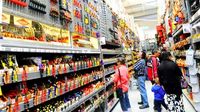The DIY Market Faces Turmoil Amid Economic Struggles
Castorama and Brico Dépôt Report Significant Sales Declines as Kingfisher Adjusts Strategies
The DIY market in France is experiencing a significant downturn, with reports indicating a 6% decline in 2024, following a 4% drop in 2023. This troubling trend is reflected in the sales figures of major retailers in the sector, particularly Castorama and Brico Dépôt, both of which are struggling to maintain their footing in an increasingly competitive market.
According to Nielsen, Castorama saw its sales decrease by 6.8%, while Brico Dépôt reported a decline of 5.3%. Even Leroy Merlin, the market leader, is not immune to the downturn, with its sales dropping by 3.2% to 9.6 billion euros in 2024. This decline has raised concerns about the overall health of the DIY sector in France.
The factors contributing to this decline are multifaceted. A combination of a sluggish real estate market, declining consumer confidence, inflation, and a lingering post-COVID hangover has created a challenging environment for DIY retailers. The mild winter has further exacerbated the situation, leading to poor seasonal sales, particularly in gardening supplies.
Moreover, the French government's budget for 2025 has introduced cuts to subsidies for energy renovation projects, which is expected to slow down renovation activities significantly. Kingfisher, the parent company of Castorama and Brico Dépôt, is feeling the impact of these economic pressures, reporting an annual profit decrease of 7% in 2024. The company's adjusted pre-tax profit stood at 528 million pounds for the year ending January 31, 2025, and it forecasts a profit ranging between 480 million pounds to 540 million pounds for the fiscal year 2025/26.
Thierry Garnier, Kingfisher's CEO, noted, "For the coming year, the budgetary measures from the British and French governments add to the rising costs for retailers and impact household confidence in the short term." This statement underscores the broader economic challenges that are affecting consumer spending habits.
In response to these difficulties, Kingfisher is implementing several strategic initiatives to improve profitability. These include modernizing stores, reducing retail space, developing a franchise model, and transitioning some stores to the Brico Dépôt brand. Despite these efforts, the outlook for 2025 remains grim, with an anticipated further decline of 2% in the market.
Interestingly, while physical store sales are faltering, there is a notable shift towards online shopping. Castorama's digital sales increased by 13.4%, highlighting a growing preference among consumers for online purchases over traditional brick-and-mortar shopping. However, this increase has not been sufficient to offset the overall decline in sales.
The trend towards online shopping reflects broader changes in consumer behavior, as households become more cautious about spending amid rising prices and stagnant wages. High-ticket items, such as kitchen renovations, continue to perform better than smaller DIY projects, which have seen a marked decrease in interest.
As the DIY sector grapples with these challenges, the future of home improvement in France appears uncertain. With consumers increasingly hesitant to invest in home projects, retailers must adapt quickly to changing market dynamics if they hope to survive.
Despite the current struggles, there remains a glimmer of hope for the industry. The potential for recovery exists, particularly if economic conditions improve and consumer confidence is restored. For now, however, the DIY market is in a precarious position, and retailers must navigate these turbulent waters with caution and innovation.
As Kingfisher and its subsidiaries work to adapt to these changes, the focus will be on creating a more resilient business model that can withstand economic fluctuations. The coming months will be crucial for determining whether the DIY market can rebound from its current state or if it will continue to face steep declines.
In conclusion, the DIY market in France is at a crossroads, challenged by economic pressures and shifting consumer behaviors. The industry must evolve rapidly to address these issues and find new ways to engage customers in a landscape that is increasingly dominated by online sales.




